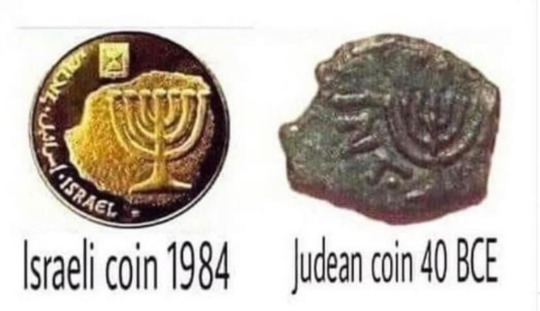#judea and samaria
Explore tagged Tumblr posts
Text

According to some people a pregnant woman and her unborn child are “legitimate military targets” because they live in their ancestral homeland.
190 notes
·
View notes
Text

Jews are indigenous to Judea (and Palestine). Not Arabs. Not Muslims.
#israel#secular-jew#jewish#judaism#israeli#jerusalem#diaspora#secular jew#secularjew#islam#judea#judea and samaria#Samaria#coinage#ancient coins#Judean#indigenous#indigeneity
298 notes
·
View notes
Text

The war has me radicalised.
43 notes
·
View notes
Text
instagram
The “Palestinian” authority wants to expel all Jews from their native homeland. A place literally called JUDEA. Everyone’s accusing Israel of carrying an ethnic cleansing, no one is pointing the finger at the people who are actually planning one.
Israel has over 2 million Arabs living in its borders and treats them as equal citizens. Yet in the Palestinian Territories, the story is very different.
The worst part is that the UN would probably vote in favour of the order, because the United Nations is built off of the hatred of Jews
#israel#jumblr#i stand with israel#palestinian hypocrisy#antisemitism#hamas is isis#pa is isis#Palestinian authority is Isis#palestine#Judea#Samaria#Gaza#Judea and Samaria#West Bank#Instagram
53 notes
·
View notes
Text
Hafiz Rashid at The New Republic:
Republicans in Congress are taking further steps to ignore Palestinians in the occupied West Bank and start referring to the territory by Israel’s name “Judea and Samaria.”
Senator Tom Cotton proposed a Senate bill Thursday that would eliminate federal use of the term “West Bank,” removing it from all official U.S. government documents. His measure matches a bill that was filed in the House in February by Republican Representatives Claudia Tenney, Randy Weber, and Anthony D’Esposito. Cotton claims that Judea and Samaria is the historically accurate name for the territory, and asserts Israel’s claims over what is internationally recognized as occupied territory. “The Jewish people’s legal and historic rights to Judea and Samaria goes back thousands of years. The U.S. should stop using the politically charged term West Bank to refer to the biblical heartland of Israel,” Cotton said in a statement. “Politically charged” is quite the exaggeration from Cotton. The International Court of Justice ruled in July that Israel’s occupation of the West Bank is illegal under international law, calling into question their terminology for the territory. Since Israel began its occupation of Palestine in 1967 following the Six-Day War, Israel has built 160 settlements that house close to 700,000 Jews in the West Bank and East Jerusalem.
AIPAC-funded puppet Sen. Tom Cotton (R-AK) introduces a history revisionist bill renaming the West Bank, a territory illegally occupied by Israel Apartheid State, “Judea and Samaria”. The change to “Judea and Samaria” will apply to all federal documents.
#Tom Cotton#Occupation of Palestine#Judea and Samaria#West Bank#Israel#Israel Apartheid State#US Senate#119th Congress#History Revisionism#Trump Administration II#Palestine#Claudia Tenney#Randy Weber#Anthony D’Esposito
19 notes
·
View notes
Text



14 notes
·
View notes
Text
Palestinian Activist Bassem Eid : Israel is not an apartheid state
youtube
If you went today to an Israeli hospital, you will find more Arabs than Jewish people. As you sit here at this cafe, you will count hundreds of Palestinian ladies with Burkas going around, sitting in the coffee shops, shopping. We have heads of departments in the Israeli hospitals who are Arabs and Muslims. We have an Arab judge who is on the supreme court. So, in my opinion, the issue of apartheid with Israel is just a political slogan–no more and no less.
In every country around the world you will find discrimination. Still in the US there is discrimination against blacks. In Jordan, you will feel the discrimination between real Jordanians and Palestinian Jordanians. In Egypt you will see discrimination between Egyptians and Bedouins, so to see discrimination between Jews and Arabs is very normal.
If in any country around the world there were people using violence, people stabbing, or people who want to commit suicide, they will suffer much more than Palestinians in the West Bank.
Take, for example, the Al Yarmouk refugee camp in Syria. When Palestinians started shooting against the regime, the regime committed a massacre against the refugees in Al Yarmouk. It used to have 80,000 Palestinian refugees inside. Today, you have a couple thousand.
Bassem Eid
#israel#ישראל#islamic jihad#fuck terrorists#עם ישראל חי#טאמבלר ישראלי#ישראבלר#am israel hai#judea and samaria#human rights#peace activism#Youtube
4 notes
·
View notes
Text

adichen5
Monastery of Saint George of Choziba in Wadi Qelt, Judea/Jericho Governorate, West Bank, Israel.
3 notes
·
View notes
Text
instagram
14 notes
·
View notes
Text
Snow White apples from the land of Milk & Honey, Israel. Also known as the "ghost apple" developed by Israeli agriculturalists. Happy Chanukah everyone!

#apples#Israeli apples#israel#secular-jew#jewish#judaism#israeli#jerusalem#diaspora#secular jew#secularjew#islam#judea#samaria#judea and samaria#Chanukah#hannukah#happy chanukah#happy hannukah#holidays#happy holiday#white apples#fruit#Israeli fruit#land of milk and honey
36 notes
·
View notes
Link
The Shin Bet’s misplaced scorn didn’t just undermine trust—it left Israel exposed. While Bar’s agency hounded Jews in Judea and Samaria, the Gaza threat grew into the nightmare of October 7th. The Jewish Division’s head mocked IDF soldiers in the West Bank as “worthless” settlers, per Israel Hayom, showing an arrogance that dismissed Israel’s defenders. Bar backed this view, telling police commanders that “hilltop youth” outranked Arab rioters as a threat—a fantasy with deadly consequences.
2 notes
·
View notes
Text

honestreporting
🔎 Context matters. Despite the media's framing, the IDF’s counterterror operations in the West Bank aren’t happening in a vacuum. Weapons, explosives, and terror cells are being uncovered regularly. If terrorists stopped plotting attacks, these raids wouldn’t be necessary. But will the media ever report why they happen?
24 notes
·
View notes
Text
חברון, שכם, שומרון, בית לחם ועזה הן ישראליות
Chevron, Shechem, Shomron, Beit Lechem and 'Aza are Israeli
Judea, Samaria and Gaza will always be Jewish.
#Hebron#Gaza#Samaria#Shechem#“Nablus”#'Aza#Chevron#israel#Eternal Zion#i stand with israel#jumblr#palestine#so called “Palestine”#bethlehem#Judea and samaria#so called west bank#no such thing as "palestine
57 notes
·
View notes
Text
BREAKING: Initial reports of a stabbing terror attack at a gas station near the Rantis checkpoint in Judea & Samaria. 49-year-old Israeli soldier in reserves has been stabbed; MDA medics on scene say the Israeli is fully conscious. The terrorist was shot, but succeeded in fleeing the scene despite his wounds.
Video (graphic)
20 notes
·
View notes
Text
by Malkah Fleisher
We are not going anywhere
One of the things I most wish our enemies understood is what an utter waste it is to kill themselves trying to kill us. It is sick that so many Palestinians are willing to launch their children at our children, losing them in the process. They just waste life. Our lives, and theirs. Yet we keep growing. We’re soft-hearted, but we are thick-skinned. Attacking us hurts, but it will not stop us.
Here’s how I put it in my previously mentioned tweet:
Do you really think killing 4 of us will create a Palestine or destroy an Israel? 40? 400? I know it’s always fun to throw a party in Shechem or Gaza, but do you not realize how utterly futile these attacks are? In the end, you will fail. There will never be a Palestine on the Land of Israel. We will not budge one inch. You caused us pain today, that’s definitely true. But we’ll just kill the killers. You achieved nothing. Like every other day. Choose life. Abandon the fruitless fight for control in the Land of Israel.
We deserve to live
Israel-haters routinely and openly justify the murder of Jews in Judea and Samaria, as if killing us is the normal response of any right-thinking person. But—and I know it’s shocking—we actually have a right to live and thrive. Returning to our land after 2,000 years of forced exile and ongoing persecution is the rectification of historical injustice. The Jews of Judea and Samaria have the guts and the spirit to stand up in the face of not just local antisemitism, but global antisemitism. We are strong and determined, and will never give up.
I have never attacked anyone, I have never stolen anyone’s land. And I don’t have to justify my existence to anyone. So I won’t. The Jews have never submitted their convictions for anyone’s recognition or permission. In that spirit, we, the Jews of Judea and Samaria, will push ahead.
I am a wife and mother who lives by choice in Judea. I will continue to teach my children to love our story, to live our story, to know our rights, and to fight for a better future. I have faced rock attacks, Molotov cocktails, and ambushes. I face daily antisemitic tropes and attacks on social media. But I won’t be deterred. Neither will my neighbors. Millions of people around the world stand with us. Millions of Israelis stand with us. The IDF stands with us. History stands with us. And I pray that God will continue to stand with us as we help advance the evolving story of Shivat Tzion—the great return to Zion.
20 notes
·
View notes
Text
youtube
Who Stole Palestine or Israel? J.e.w.s or Muslims Palestinians? #israel #islam #bible
Please 🙏 Re blog My posts.
#jerusalem#torah study#logic#jewish#youtube#torah#jew#israel#palestine terrorist#palestine#gaza war#hamas war crimes#crimes against humanity#hezbollah#hezbolá#tel aviv#israeli apartheid#israel independence day#islamic jihad#islamic#islam#muslims#muslim#quran#holy quran#jordan river#west bank#judea and samaria#gaza strip#artists on tumblr
3 notes
·
View notes